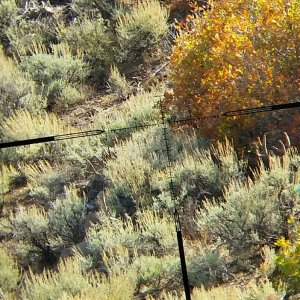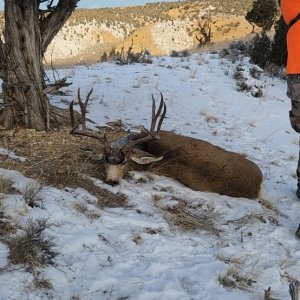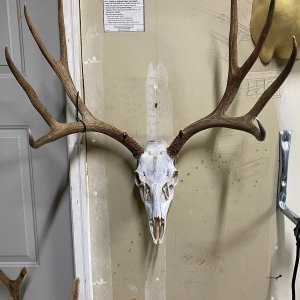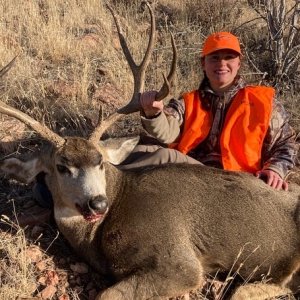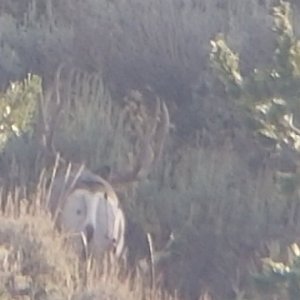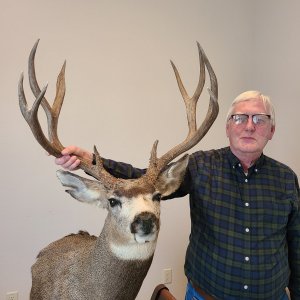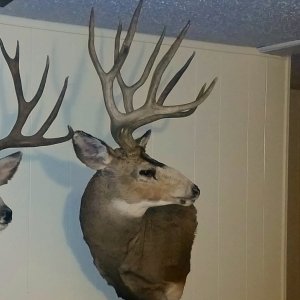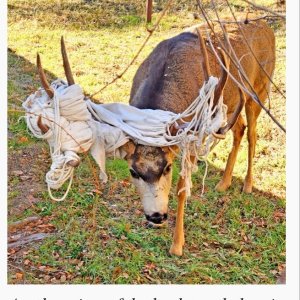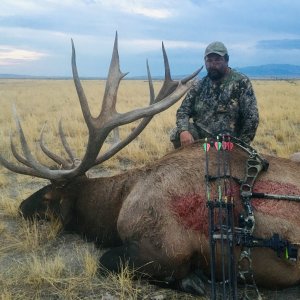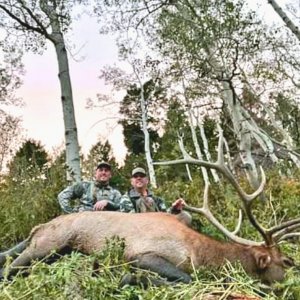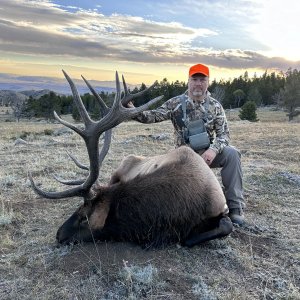Coyote_chaser
Active Member
- Messages
- 851
http://www.idahostatesman.com/usnews/story/1006950.html
CARSON CITY NV- Wildlife guzzlers - contraptions that capture rainwater and melting snow in remote places for thirsty animals to drink - have triggered a turf war between two Nevada resource agencies.
Members of the state Board of Agriculture argue that as their numbers increase, guzzlers are altering the landscape and taking precious resources, whether water or forage, from ranchers. They want to stop the Nevada Department of Wildlife from constructing any new guzzlers and are exploring possible legal challenges. Some ranchers say they are ready to sue over infringing wildlife.
"The water is an issue because water is very valuable," said Tony Lesperance, director of the Agriculture Board.
"Guzzlers change the distribution of elk," he said, and "also change the distribution where elk eat," taking available forage away from ranchers and their livestock.
The wildlife agency insists state law favors the birds, elk and bighorn sheep who drink from the guzzlers in the driest state in the country. Nevada receives about 9 inches of annual precipitation.
"Thirty years of discussion is on our side," said Chris Healy, spokesman for the Wildlife Department. "Wildlife is not a beggar at the table, but is entitled to its share of water."
The guzzler battle is just one of many conflicts that play out across Western lands where battles over sometimes scarce resources have pitted shepherds against ranchers, hikers against off-road enthusiasts and rebellious residents against the government. Water and the animals who occupy the land are often at the center of the conflict.
Around Nevada and the arid West, water is collected and stored in underground tanks for birds or large game animals to drink through the hot summer months when moisture in vegetation on the range can be as dry as tissue paper and distances between watering holes a long, dusty journey. The guzzlers range in capacity from a few hundred gallons to more than 10,000 gallons.
Dave Pulliam, a habitat specialist with the state wildlife agency, said there are 1,616 guzzlers statewide.
Most belong to the Wildlife Department, though others were installed by federal agencies, including the Forest Service, Fish and Wildlife Service and the Bureau of Land Management, which controls roughly 85 percent of the land in Nevada.
"Basically the BLM cooperates with the Nevada Department of Wildlife to put guzzlers on public lands and we rely on their expertise because they manage the wildlife," said BLM spokeswoman JoLynn Worley. An environmental assessment is prepared before new guzzlers are erected.
Some mining companies also install guzzlers when they reclaim the land after closing mines.
The largest guzzlers are mainly in southern Nevada for bighorn sheep.
"In the desert, you may not get rain for two years," Pulliam said. The larger tanks allow the capture of as much water as possible from a downpour and "hold water over for more than one hot season."
Collection aprons on the larger guzzlers measure about 8 by 12 feet, and can capture 60 gallons of water per inch of rain, he said. If grouped together, the guzzlers would take up less than 40 acres of Nevada's more than 70 million acres.
Ramona Morrison, a state Board of Agriculture member and the daughter of the late Wayne Hage, a longtime Nevada rancher and leader in the state's sagebrush rebellion movement that pushed for more local control of public lands decades ago, said "nobody really had a squawk" when guzzlers were first proposed about 30 years ago as "rain traps" for chukar, a game bird in the pheasant family.
But Morrison said guzzlers have expanded in size and scope.
"Virtually every bit of land in Nevada that is covered by rangelands, all the water arising on those lands have been put to beneficial use by the livestock industry and all of those waters are by definition vested water rights," she said.
"What that means is, every guzzler that is trapping for wildlife, it's infringing on those vested water rights," she said. "If you're going to transplant big game into an area ... NDOW may need to show up with a checkbook."
The agriculture board has asked the attorney general's office for a legal opinion on guzzlers, and whether the board has a say in state water decisions.
Morrison also is involved with the Nevada Live Stock Association. During a recent discussion by the Wildlife Commission, association president Don Alt said "there will be lawsuits" if wildlife is moved to ranching areas without compensation.
Ron Cerri, president of the Nevada Cattlemen's Association, said his organization hasn't taken an official position on the controversy.
"We're not opposed to multiple use," he said, but added he'd like more discussion with the industry before guzzlers are installed. "We understand that wildife needs to use the water too."
Healy and others said that the goal in placing guzzlers often is to keep wild animals away from the lure of water on agricultural lands.
"We're spreading out wildlife that otherwise would have impacted domestic livestock operators," Healy said.
Jim Jeffers, a retired wildlife biologist and former Nevada wildlife commissioner, said the controversy baffled him.
"I always thought guzzlers kind of work in a complimentary fashion" with the livestock industry, he said.
Guzzlers are targeted in "areas where you have habitat but you don't have water," he said. "If you don't have water there, how is that taking away from livestock?"
Jeffers said guzzlers aid creatures big and small, from kangaroo rats and bats to big game animals.
Without guzzlers, he said, "you would diminish the range of a lot of wildlife in the state considerably."
Allen Biaggi, director of the Nevada Department of Conservation and Natural Resources, and Tracy Taylor, state water engineer, said it's not the first time the issue has come up.
They point to a 1982 letter from then State Engineer Pete Morros, who was asked whether guzzlers require water rights.
Morros cited a 1981 law, which said anyone wanting to obtain a right to use water from a spring or ground seepage "must ensure that wildlife which customarily uses the water will have access to it."
It concluded, "Unquestionably the guzzlers provide benefits to wildlife which is in the public interest and welfare," and therefore placement of guzzlers for wildlife only does not require acquiring water rights.
The letter is still followed as state policy, Biaggi said.
He said in many valleys where agriculture is present, springs and streams have dried up that would otherwise have been available for wildlife.
"These guzzlers have done nothing more than replace historic uses," he said.
But Morrison said the policy doesn't constitute due process for ranchers, who also have aided wildlife through their own water projects.
"It's been a very beneficial relationship between livestock and game," she said. "But we object when game is managed at the expense and exclusion of the livestock operator, and that's where this is going."
Public land ranching helping out us sportsman one more time!!! ha... This stuff is a joke.
CARSON CITY NV- Wildlife guzzlers - contraptions that capture rainwater and melting snow in remote places for thirsty animals to drink - have triggered a turf war between two Nevada resource agencies.
Members of the state Board of Agriculture argue that as their numbers increase, guzzlers are altering the landscape and taking precious resources, whether water or forage, from ranchers. They want to stop the Nevada Department of Wildlife from constructing any new guzzlers and are exploring possible legal challenges. Some ranchers say they are ready to sue over infringing wildlife.
"The water is an issue because water is very valuable," said Tony Lesperance, director of the Agriculture Board.
"Guzzlers change the distribution of elk," he said, and "also change the distribution where elk eat," taking available forage away from ranchers and their livestock.
The wildlife agency insists state law favors the birds, elk and bighorn sheep who drink from the guzzlers in the driest state in the country. Nevada receives about 9 inches of annual precipitation.
"Thirty years of discussion is on our side," said Chris Healy, spokesman for the Wildlife Department. "Wildlife is not a beggar at the table, but is entitled to its share of water."
The guzzler battle is just one of many conflicts that play out across Western lands where battles over sometimes scarce resources have pitted shepherds against ranchers, hikers against off-road enthusiasts and rebellious residents against the government. Water and the animals who occupy the land are often at the center of the conflict.
Around Nevada and the arid West, water is collected and stored in underground tanks for birds or large game animals to drink through the hot summer months when moisture in vegetation on the range can be as dry as tissue paper and distances between watering holes a long, dusty journey. The guzzlers range in capacity from a few hundred gallons to more than 10,000 gallons.
Dave Pulliam, a habitat specialist with the state wildlife agency, said there are 1,616 guzzlers statewide.
Most belong to the Wildlife Department, though others were installed by federal agencies, including the Forest Service, Fish and Wildlife Service and the Bureau of Land Management, which controls roughly 85 percent of the land in Nevada.
"Basically the BLM cooperates with the Nevada Department of Wildlife to put guzzlers on public lands and we rely on their expertise because they manage the wildlife," said BLM spokeswoman JoLynn Worley. An environmental assessment is prepared before new guzzlers are erected.
Some mining companies also install guzzlers when they reclaim the land after closing mines.
The largest guzzlers are mainly in southern Nevada for bighorn sheep.
"In the desert, you may not get rain for two years," Pulliam said. The larger tanks allow the capture of as much water as possible from a downpour and "hold water over for more than one hot season."
Collection aprons on the larger guzzlers measure about 8 by 12 feet, and can capture 60 gallons of water per inch of rain, he said. If grouped together, the guzzlers would take up less than 40 acres of Nevada's more than 70 million acres.
Ramona Morrison, a state Board of Agriculture member and the daughter of the late Wayne Hage, a longtime Nevada rancher and leader in the state's sagebrush rebellion movement that pushed for more local control of public lands decades ago, said "nobody really had a squawk" when guzzlers were first proposed about 30 years ago as "rain traps" for chukar, a game bird in the pheasant family.
But Morrison said guzzlers have expanded in size and scope.
"Virtually every bit of land in Nevada that is covered by rangelands, all the water arising on those lands have been put to beneficial use by the livestock industry and all of those waters are by definition vested water rights," she said.
"What that means is, every guzzler that is trapping for wildlife, it's infringing on those vested water rights," she said. "If you're going to transplant big game into an area ... NDOW may need to show up with a checkbook."
The agriculture board has asked the attorney general's office for a legal opinion on guzzlers, and whether the board has a say in state water decisions.
Morrison also is involved with the Nevada Live Stock Association. During a recent discussion by the Wildlife Commission, association president Don Alt said "there will be lawsuits" if wildlife is moved to ranching areas without compensation.
Ron Cerri, president of the Nevada Cattlemen's Association, said his organization hasn't taken an official position on the controversy.
"We're not opposed to multiple use," he said, but added he'd like more discussion with the industry before guzzlers are installed. "We understand that wildife needs to use the water too."
Healy and others said that the goal in placing guzzlers often is to keep wild animals away from the lure of water on agricultural lands.
"We're spreading out wildlife that otherwise would have impacted domestic livestock operators," Healy said.
Jim Jeffers, a retired wildlife biologist and former Nevada wildlife commissioner, said the controversy baffled him.
"I always thought guzzlers kind of work in a complimentary fashion" with the livestock industry, he said.
Guzzlers are targeted in "areas where you have habitat but you don't have water," he said. "If you don't have water there, how is that taking away from livestock?"
Jeffers said guzzlers aid creatures big and small, from kangaroo rats and bats to big game animals.
Without guzzlers, he said, "you would diminish the range of a lot of wildlife in the state considerably."
Allen Biaggi, director of the Nevada Department of Conservation and Natural Resources, and Tracy Taylor, state water engineer, said it's not the first time the issue has come up.
They point to a 1982 letter from then State Engineer Pete Morros, who was asked whether guzzlers require water rights.
Morros cited a 1981 law, which said anyone wanting to obtain a right to use water from a spring or ground seepage "must ensure that wildlife which customarily uses the water will have access to it."
It concluded, "Unquestionably the guzzlers provide benefits to wildlife which is in the public interest and welfare," and therefore placement of guzzlers for wildlife only does not require acquiring water rights.
The letter is still followed as state policy, Biaggi said.
He said in many valleys where agriculture is present, springs and streams have dried up that would otherwise have been available for wildlife.
"These guzzlers have done nothing more than replace historic uses," he said.
But Morrison said the policy doesn't constitute due process for ranchers, who also have aided wildlife through their own water projects.
"It's been a very beneficial relationship between livestock and game," she said. "But we object when game is managed at the expense and exclusion of the livestock operator, and that's where this is going."
Public land ranching helping out us sportsman one more time!!! ha... This stuff is a joke.


